Adult Education: Digital Learning Theories and Concept Map Analysis
VerifiedAdded on 2021/06/17
|6
|967
|20
Report
AI Summary
This report explores digital learning theories within the context of adult education, presenting a concept map that integrates both traditional and contemporary approaches. The report examines constructivism, connectivism, cognitive learning, and objectivism, highlighting their respective strengths and weaknesses in the digital learning environment. It emphasizes the importance of facilitation skills in guiding adult learners through self-directed and problem-based learning experiences. The analysis delves into the practical application of these theories, considering the challenges and opportunities presented by the internet and digital tools. It supports the use of interconnected learning and critical thinking, particularly for higher education, and provides insights into how educators can simplify complex learning theories to enhance the development of adult learners. References to key theorists and research are included to support the analysis.
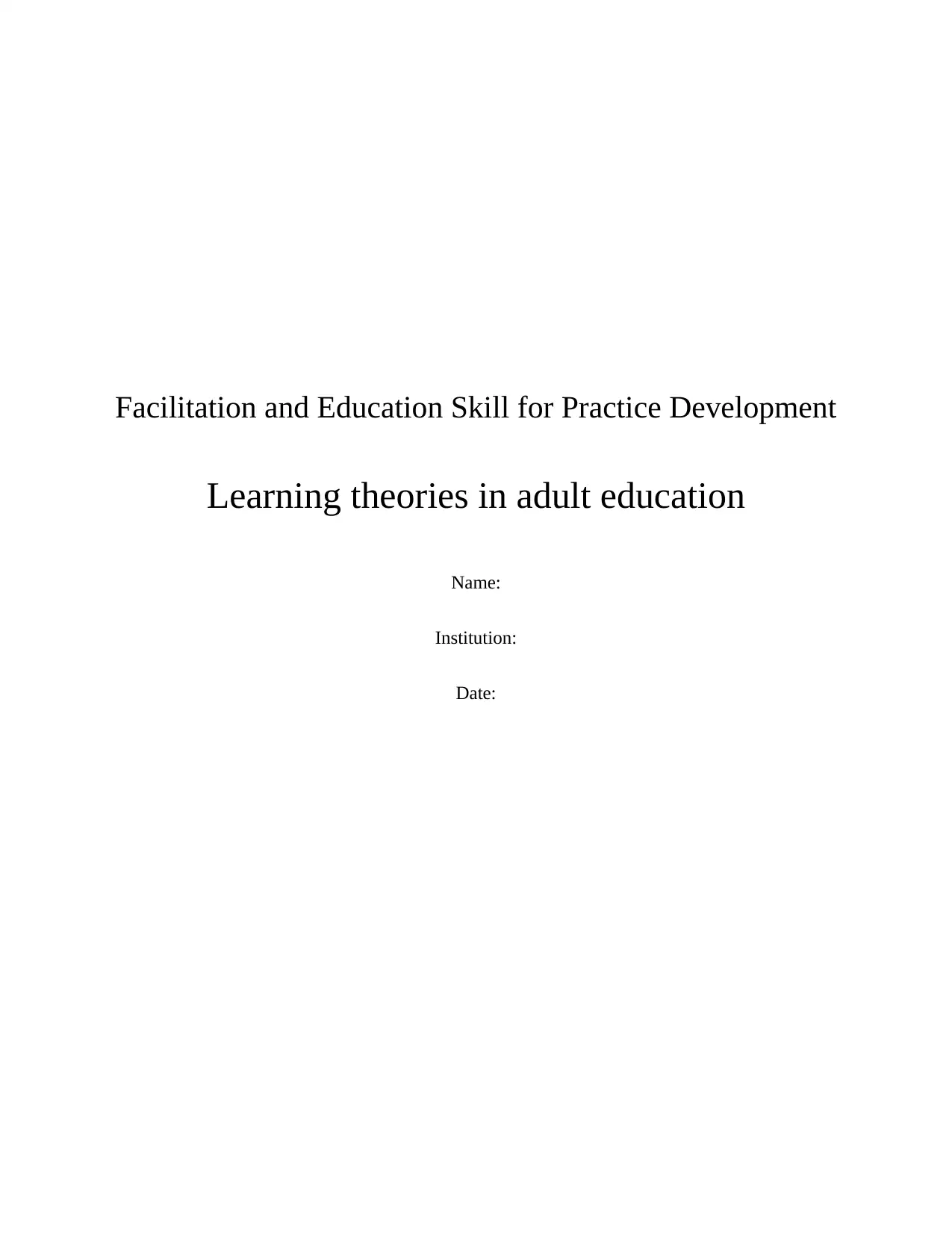
Facilitation and Education Skill for Practice Development
Learning theories in adult education
Name:
Institution:
Date:
Learning theories in adult education
Name:
Institution:
Date:
Paraphrase This Document
Need a fresh take? Get an instant paraphrase of this document with our AI Paraphraser
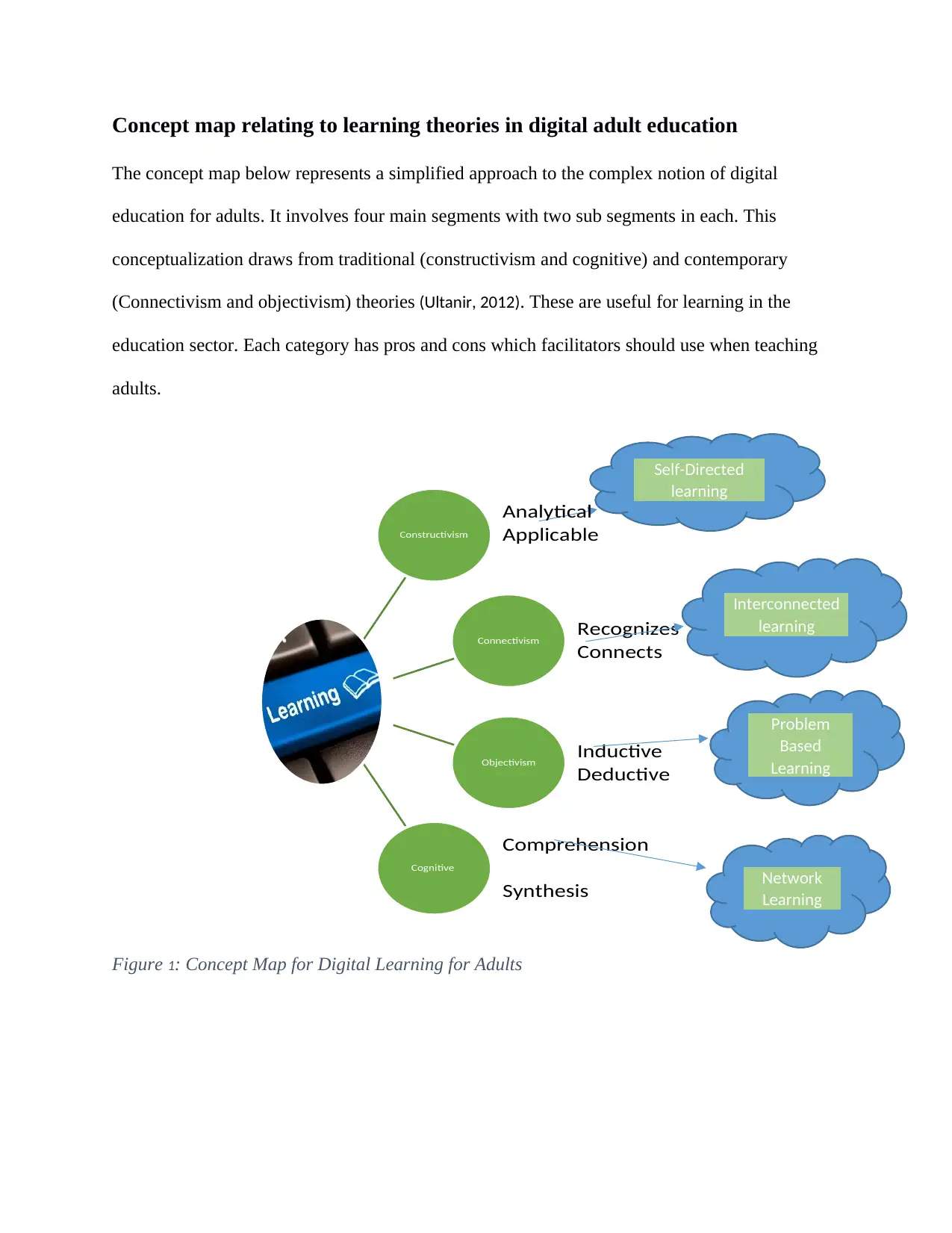
Concept map relating to learning theories in digital adult education
The concept map below represents a simplified approach to the complex notion of digital
education for adults. It involves four main segments with two sub segments in each. This
conceptualization draws from traditional (constructivism and cognitive) and contemporary
(Connectivism and objectivism) theories (Ultanir, 2012). These are useful for learning in the
education sector. Each category has pros and cons which facilitators should use when teaching
adults.
Figure 1: Concept Map for Digital Learning for Adults
Constructivism
Analytical
Applicable
Connectivism Recognizes
Connects
Objectivism Inductive
Deductive
Cognitive
Comprehension
Synthesis
Self-Directed
learning
Interconnected
learning
Problem
Based
Learning
Network
Learning
The concept map below represents a simplified approach to the complex notion of digital
education for adults. It involves four main segments with two sub segments in each. This
conceptualization draws from traditional (constructivism and cognitive) and contemporary
(Connectivism and objectivism) theories (Ultanir, 2012). These are useful for learning in the
education sector. Each category has pros and cons which facilitators should use when teaching
adults.
Figure 1: Concept Map for Digital Learning for Adults
Constructivism
Analytical
Applicable
Connectivism Recognizes
Connects
Objectivism Inductive
Deductive
Cognitive
Comprehension
Synthesis
Self-Directed
learning
Interconnected
learning
Problem
Based
Learning
Network
Learning
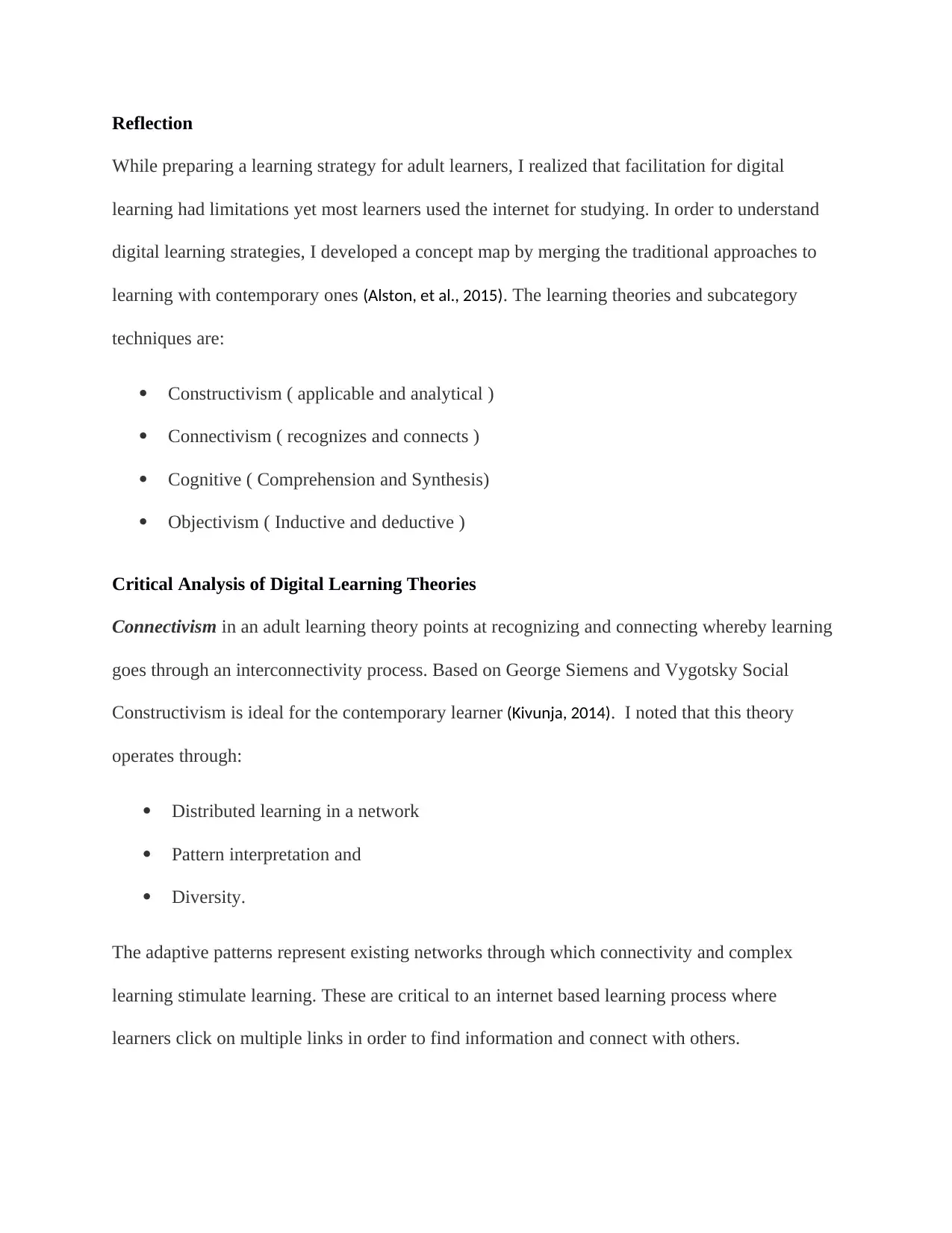
Reflection
While preparing a learning strategy for adult learners, I realized that facilitation for digital
learning had limitations yet most learners used the internet for studying. In order to understand
digital learning strategies, I developed a concept map by merging the traditional approaches to
learning with contemporary ones (Alston, et al., 2015). The learning theories and subcategory
techniques are:
Constructivism ( applicable and analytical )
Connectivism ( recognizes and connects )
Cognitive ( Comprehension and Synthesis)
Objectivism ( Inductive and deductive )
Critical Analysis of Digital Learning Theories
Connectivism in an adult learning theory points at recognizing and connecting whereby learning
goes through an interconnectivity process. Based on George Siemens and Vygotsky Social
Constructivism is ideal for the contemporary learner (Kivunja, 2014). I noted that this theory
operates through:
Distributed learning in a network
Pattern interpretation and
Diversity.
The adaptive patterns represent existing networks through which connectivity and complex
learning stimulate learning. These are critical to an internet based learning process where
learners click on multiple links in order to find information and connect with others.
While preparing a learning strategy for adult learners, I realized that facilitation for digital
learning had limitations yet most learners used the internet for studying. In order to understand
digital learning strategies, I developed a concept map by merging the traditional approaches to
learning with contemporary ones (Alston, et al., 2015). The learning theories and subcategory
techniques are:
Constructivism ( applicable and analytical )
Connectivism ( recognizes and connects )
Cognitive ( Comprehension and Synthesis)
Objectivism ( Inductive and deductive )
Critical Analysis of Digital Learning Theories
Connectivism in an adult learning theory points at recognizing and connecting whereby learning
goes through an interconnectivity process. Based on George Siemens and Vygotsky Social
Constructivism is ideal for the contemporary learner (Kivunja, 2014). I noted that this theory
operates through:
Distributed learning in a network
Pattern interpretation and
Diversity.
The adaptive patterns represent existing networks through which connectivity and complex
learning stimulate learning. These are critical to an internet based learning process where
learners click on multiple links in order to find information and connect with others.
⊘ This is a preview!⊘
Do you want full access?
Subscribe today to unlock all pages.

Trusted by 1+ million students worldwide
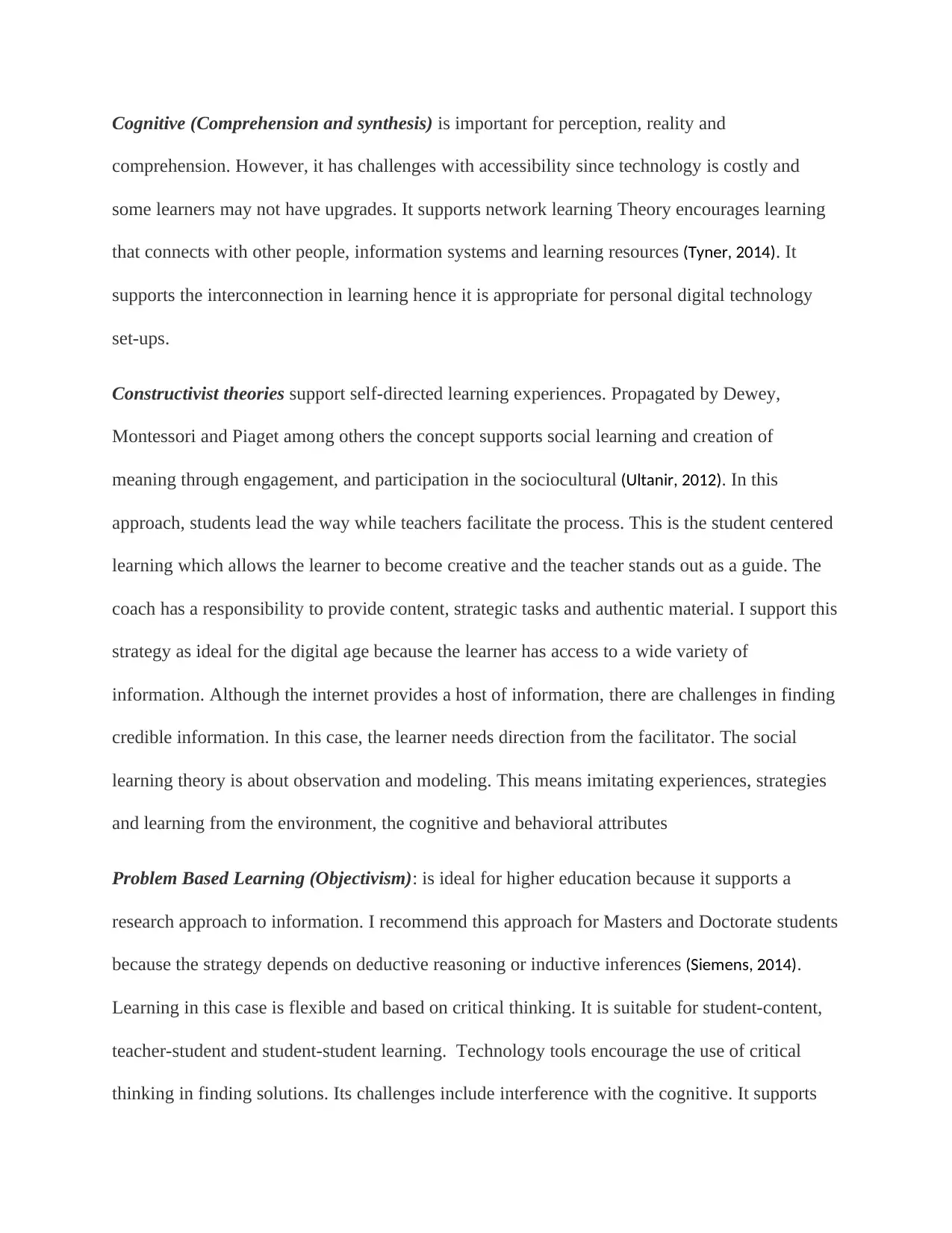
Cognitive (Comprehension and synthesis) is important for perception, reality and
comprehension. However, it has challenges with accessibility since technology is costly and
some learners may not have upgrades. It supports network learning Theory encourages learning
that connects with other people, information systems and learning resources (Tyner, 2014). It
supports the interconnection in learning hence it is appropriate for personal digital technology
set-ups.
Constructivist theories support self-directed learning experiences. Propagated by Dewey,
Montessori and Piaget among others the concept supports social learning and creation of
meaning through engagement, and participation in the sociocultural (Ultanir, 2012). In this
approach, students lead the way while teachers facilitate the process. This is the student centered
learning which allows the learner to become creative and the teacher stands out as a guide. The
coach has a responsibility to provide content, strategic tasks and authentic material. I support this
strategy as ideal for the digital age because the learner has access to a wide variety of
information. Although the internet provides a host of information, there are challenges in finding
credible information. In this case, the learner needs direction from the facilitator. The social
learning theory is about observation and modeling. This means imitating experiences, strategies
and learning from the environment, the cognitive and behavioral attributes
Problem Based Learning (Objectivism): is ideal for higher education because it supports a
research approach to information. I recommend this approach for Masters and Doctorate students
because the strategy depends on deductive reasoning or inductive inferences (Siemens, 2014).
Learning in this case is flexible and based on critical thinking. It is suitable for student-content,
teacher-student and student-student learning. Technology tools encourage the use of critical
thinking in finding solutions. Its challenges include interference with the cognitive. It supports
comprehension. However, it has challenges with accessibility since technology is costly and
some learners may not have upgrades. It supports network learning Theory encourages learning
that connects with other people, information systems and learning resources (Tyner, 2014). It
supports the interconnection in learning hence it is appropriate for personal digital technology
set-ups.
Constructivist theories support self-directed learning experiences. Propagated by Dewey,
Montessori and Piaget among others the concept supports social learning and creation of
meaning through engagement, and participation in the sociocultural (Ultanir, 2012). In this
approach, students lead the way while teachers facilitate the process. This is the student centered
learning which allows the learner to become creative and the teacher stands out as a guide. The
coach has a responsibility to provide content, strategic tasks and authentic material. I support this
strategy as ideal for the digital age because the learner has access to a wide variety of
information. Although the internet provides a host of information, there are challenges in finding
credible information. In this case, the learner needs direction from the facilitator. The social
learning theory is about observation and modeling. This means imitating experiences, strategies
and learning from the environment, the cognitive and behavioral attributes
Problem Based Learning (Objectivism): is ideal for higher education because it supports a
research approach to information. I recommend this approach for Masters and Doctorate students
because the strategy depends on deductive reasoning or inductive inferences (Siemens, 2014).
Learning in this case is flexible and based on critical thinking. It is suitable for student-content,
teacher-student and student-student learning. Technology tools encourage the use of critical
thinking in finding solutions. Its challenges include interference with the cognitive. It supports
Paraphrase This Document
Need a fresh take? Get an instant paraphrase of this document with our AI Paraphraser
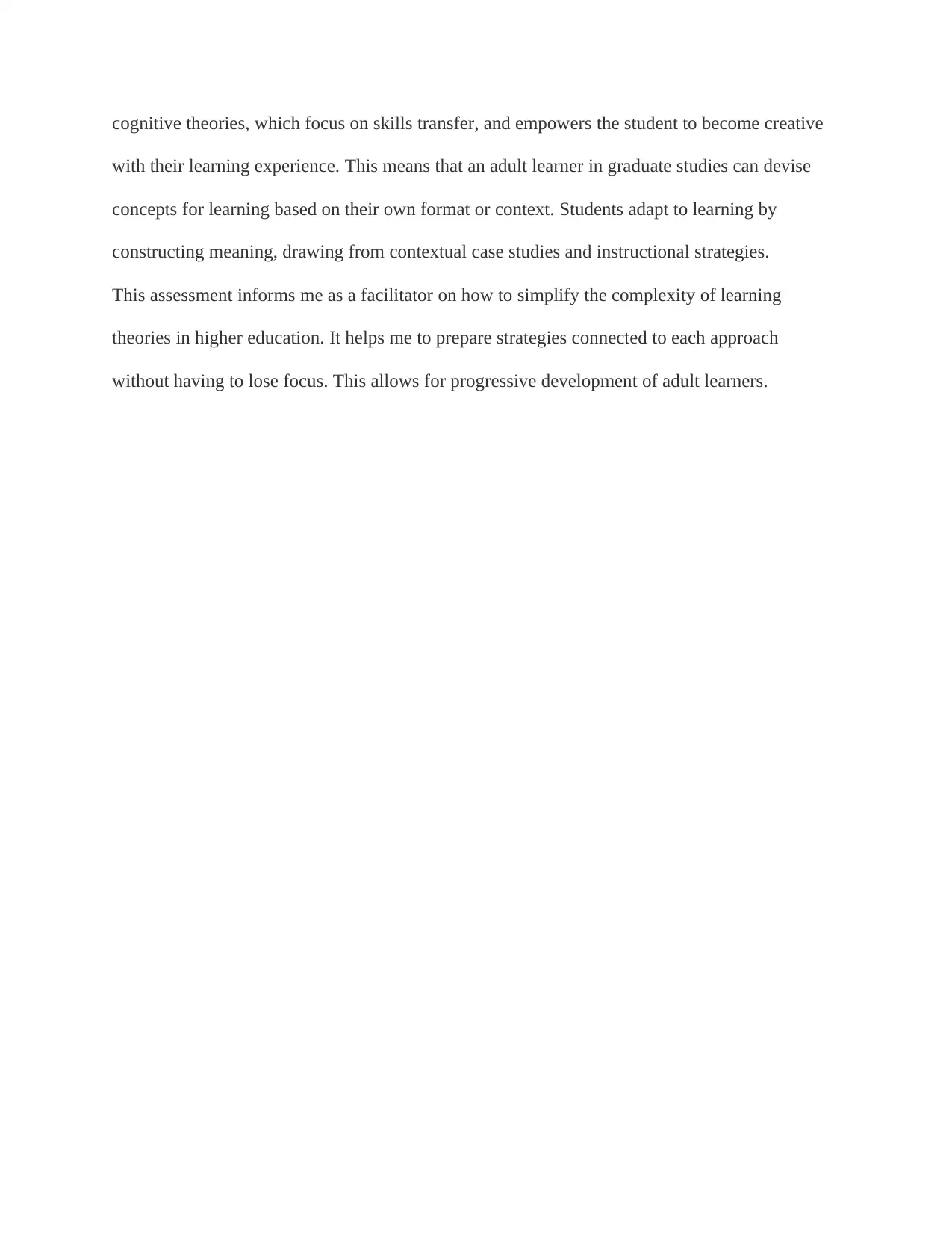
cognitive theories, which focus on skills transfer, and empowers the student to become creative
with their learning experience. This means that an adult learner in graduate studies can devise
concepts for learning based on their own format or context. Students adapt to learning by
constructing meaning, drawing from contextual case studies and instructional strategies.
This assessment informs me as a facilitator on how to simplify the complexity of learning
theories in higher education. It helps me to prepare strategies connected to each approach
without having to lose focus. This allows for progressive development of adult learners.
with their learning experience. This means that an adult learner in graduate studies can devise
concepts for learning based on their own format or context. Students adapt to learning by
constructing meaning, drawing from contextual case studies and instructional strategies.
This assessment informs me as a facilitator on how to simplify the complexity of learning
theories in higher education. It helps me to prepare strategies connected to each approach
without having to lose focus. This allows for progressive development of adult learners.
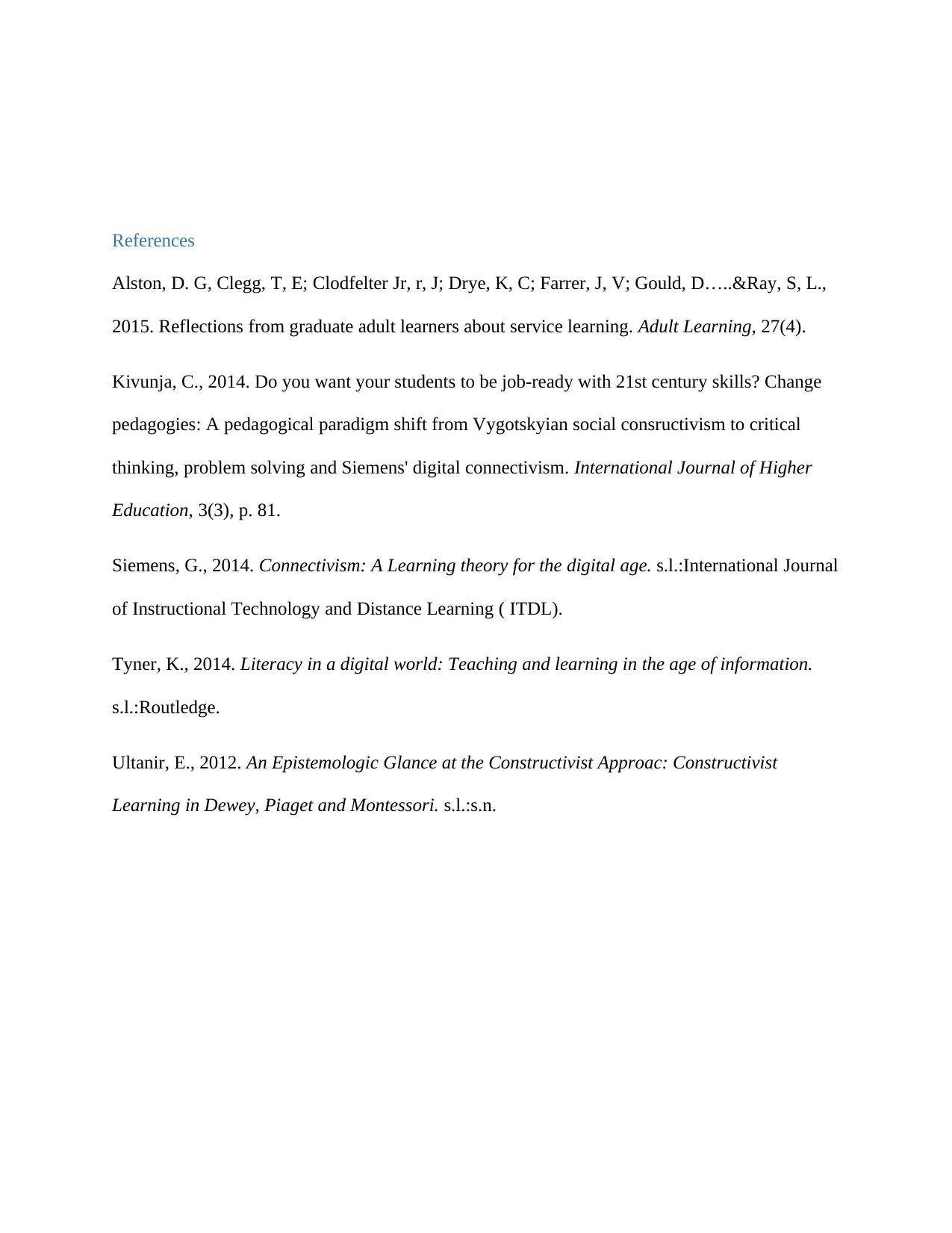
References
Alston, D. G, Clegg, T, E; Clodfelter Jr, r, J; Drye, K, C; Farrer, J, V; Gould, D…..&Ray, S, L.,
2015. Reflections from graduate adult learners about service learning. Adult Learning, 27(4).
Kivunja, C., 2014. Do you want your students to be job-ready with 21st century skills? Change
pedagogies: A pedagogical paradigm shift from Vygotskyian social consructivism to critical
thinking, problem solving and Siemens' digital connectivism. International Journal of Higher
Education, 3(3), p. 81.
Siemens, G., 2014. Connectivism: A Learning theory for the digital age. s.l.:International Journal
of Instructional Technology and Distance Learning ( ITDL).
Tyner, K., 2014. Literacy in a digital world: Teaching and learning in the age of information.
s.l.:Routledge.
Ultanir, E., 2012. An Epistemologic Glance at the Constructivist Approac: Constructivist
Learning in Dewey, Piaget and Montessori. s.l.:s.n.
Alston, D. G, Clegg, T, E; Clodfelter Jr, r, J; Drye, K, C; Farrer, J, V; Gould, D…..&Ray, S, L.,
2015. Reflections from graduate adult learners about service learning. Adult Learning, 27(4).
Kivunja, C., 2014. Do you want your students to be job-ready with 21st century skills? Change
pedagogies: A pedagogical paradigm shift from Vygotskyian social consructivism to critical
thinking, problem solving and Siemens' digital connectivism. International Journal of Higher
Education, 3(3), p. 81.
Siemens, G., 2014. Connectivism: A Learning theory for the digital age. s.l.:International Journal
of Instructional Technology and Distance Learning ( ITDL).
Tyner, K., 2014. Literacy in a digital world: Teaching and learning in the age of information.
s.l.:Routledge.
Ultanir, E., 2012. An Epistemologic Glance at the Constructivist Approac: Constructivist
Learning in Dewey, Piaget and Montessori. s.l.:s.n.
⊘ This is a preview!⊘
Do you want full access?
Subscribe today to unlock all pages.

Trusted by 1+ million students worldwide
1 out of 6
Related Documents
Your All-in-One AI-Powered Toolkit for Academic Success.
+13062052269
info@desklib.com
Available 24*7 on WhatsApp / Email
![[object Object]](/_next/static/media/star-bottom.7253800d.svg)
Unlock your academic potential
Copyright © 2020–2026 A2Z Services. All Rights Reserved. Developed and managed by ZUCOL.




